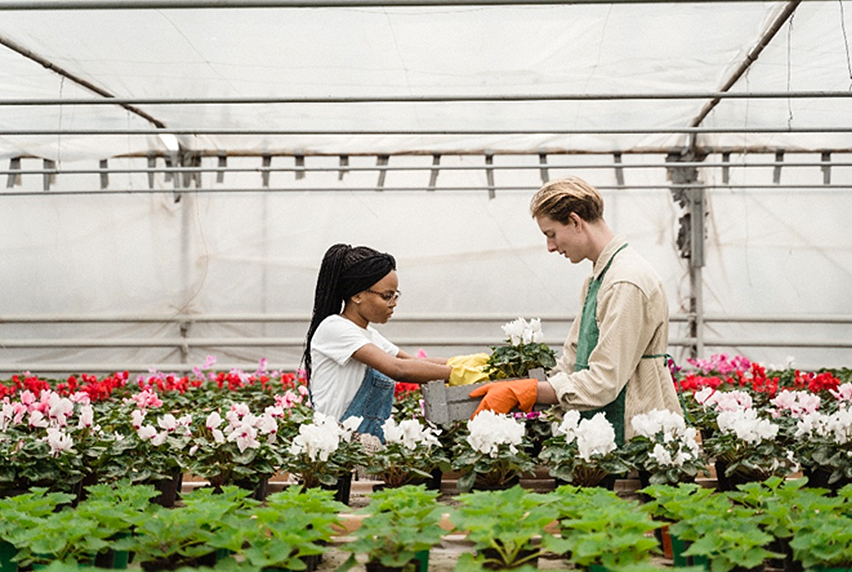Floristry vs. Horticulture: Which Career Path Should You Choose?

If you're passionate about working with plants, you may be considering a career in either Floristry and Horticulture.
Both of these fields can be incredibly rewarding, but they have distinct differences that can make one path a better fit than the other.
By the end of this article, you'll have a better understanding of which career path is the right one for you.
What Is Floristry?
Floristry is the art of arranging flowers and creating beautiful bouquets for special occasions such as weddings, funerals, and other events.
Florists are responsible for selecting the right flowers for a particular occasion, arranging them in an aesthetically pleasing way, and ensuring they stay fresh and healthy. They may also work with other materials such as ribbons, vases, and other decorative elements.
To be successful in Floristry, you should have a creative eye for colour and design. You'll need to be able to visualise how different flowers will look together and how to create arrangements that will be visually appealing. Attention to detail is also crucial, as you'll need to ensure that each flower is placed just right and that the overall arrangement is balanced.
What Are the Skills Needed for Floristry?
In addition to creativity and attention to detail, florists need to have excellent communication skills. They'll need to work closely with clients to understand their needs and preferences, and then translate those preferences into beautiful arrangements. They will also need to be able to work under pressure, as events such as weddings and funerals often have tight deadlines.
Florists should also have a good understanding of floristry techniques and the science behind plants. They'll need to know how to care for different types of flowers and plant species, and how to keep them fresh and healthy. This includes knowing how to properly cut flowers, how much water to give each plant, and how to keep them at the right temperature.
Floristry Courses and Training
While a formal education is not always necessary to enter the Floristry industry, many florists choose to pursue a degree or certification in Floristry. These programs can offer valuable training in design, plant care, and business management.
Many community colleges and vocational institutes, like Melbourne Polytechnic, offer certificates in Floristry, with pathway degrees to programs in Horticulture. Additionally, many florists offer on-the-job training or apprenticeships for those interested in the field.
What Are the Career Opportunities in Floristry?
Florists can work in a variety of settings, including flower shops, grocery stores, and event-planning firms. Some florists also choose to start their own floristry business, which can be a challenging but rewarding path.
There are also opportunities for advancement in the field, such as becoming a head designer or opening a chain of flower shops. Additionally, some florists choose to specialise in a particular type of arrangement, such as wedding bouquets or funeral arrangements.
What is Horticulture?
Horticulture is the science of plant cultivation and propagation. Horticulturists work to improve the growth, quality, and yield of plants, and often focus on areas such as plant breeding, pest management, and landscaping.
Horticulturists may work in a wide variety of settings, from nurseries and greenhouses to botanical gardens and public parks.
What Are the Skills Needed for Horticulture?
In addition to a love of plants, horticulturists should have a strong understanding of soil science, plant physiology, and pest management. They'll need to be able to identify different types of plants and understand their specific care requirements.
Horticulturists should also have strong analytical and problem-solving skills. They'll need to be able to diagnose plant problems and come up with solutions to improve their health and growth.
Horticulture Courses and Training
A qualification in Horticulture or a related field is usually required to become a horticulturist. Melbourne Polytechnic’s Certificate IV in Horticulture AHC40416 covers plant nutrition, irrigation, and operation of specialist machinery. With the opportunity to pathway into a Diploma of Horticulture.
In addition to formal education, Horticulture students can gain experience through internships or working in the field. Continuing education is also important in this field, as new plant varieties and technologies are constantly being developed.
What Are the Career Opportunities in Horticulture?
Horticulturists can work in a variety of settings, from public parks to private gardens to research institutions. Some horticulturists also choose to start their own landscaping or nursery businesses.
There are also opportunities for advancement in the field, such as becoming a head horticulturist at a public garden or working in plant breeding for a seed company. Additionally, some horticulturists choose to specialise in a particular area of plant science, such as arboriculture or turf management.
Which Career Path Is Best?
Choosing between Floristry and Horticulture ultimately comes down to your interests, practical skills, and career goals.
If you have a creative eye for design and enjoy working with clients on special events, our Certificate II in Floristry (Assistant) SFL20115 or Certificate III in Floristry SFL30115 Non-Apprenticeship may be a better fit for you. If you're passionate about plant science and enjoy problem-solving, our Horticulture courses may be the way to go.
Regardless of which path you choose, both Floristry and Horticulture can be incredibly rewarding careers that allow you to work with beautiful plants and make a positive impact on the environment. With the right training, skills, and dedication, you can succeed in either field and enjoy a fulfilling career doing what you love.
Floristry & Horticulture
Combine an eye for design with fine dexterity skills into a bunch of career opportunities in the Floristry and Horticulture fields.